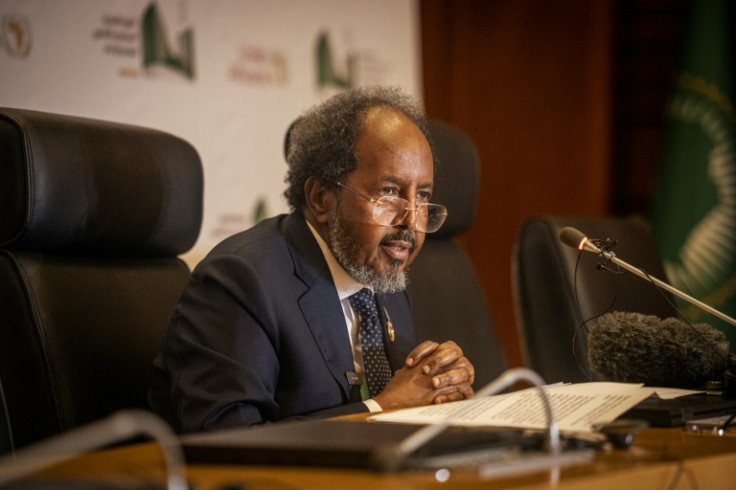Somalia Accuses Ethiopia Of Trying To Block AU Summit Access

Somalia and Ethiopia, already at odds over a controversial maritime pact, locked horns again on Saturday over Somali claims that Ethiopian security forces tried to block President Hassan Sheikh Mohamud from accessing the African Union summit.
Mogadishu described the incident as "outrageous conduct" and called for a full investigation by the pan-African body which is headquartered in the Ethiopian capital Addis Ababa.
But Ethiopia insisted Mohamud was warmly welcomed and said that the Somali delegation was blocked when its security detail tried to enter a venue with weapons.
Tensions have been running high between the two countries since Addis Ababa in January signed a memorandum of understanding with the breakaway region of Somaliland giving it long sought commercial and military access to the sea.
"This morning when I prepared myself to come and attend the closed session of the summit, the Ethiopian security blocked my way," Mohamud told reporters, after later gaining entry to the venue for the meeting.
He said he had tried again with another head of state, Djibouti President Ismail Omar Guelleh, but they were also blocked from the AU headquarters.
"A soldier with a gun stood in front of us and denied us access to this facility," he said.
But Ethiopia challenged Somalia's version of events.
Prime Minister Abiy Ahmed's spokeswoman Billene Seyoum told AFP that Ethiopia had "warmly welcomed" Mohamud and accorded him the full honours of visiting heads of state and governments to the summit.
She said the Somalia delegation had declined the security offered by Ethiopia and tried to enter a venue with their weapons.
"As host country, the government of Ethiopia is responsible for the security of all Heads of State and Government while in the country," Billene said.
"The Somali delegation security attempted to enter the AUC premises with weapons which was blocked off by AUC security."
Somalia's foreign ministry said in a statement that the government "strongly condemns the provocative attempt by the Ethiopian government to obstruct the delegation".
It called for the AU -- a 55-member pan-African body -- to conduct a "credible and independent investigation (into) this outrageous conduct", saying it breached all diplomatic and international protocols.
Somalia has accused Ethiopia of violating its sovereignty and territorial integrity over the January 1 MoU with Somaliland, which declared independence in 1991 in a move not recognised by the international community.
Under the maritime deal, Somaliland agreed to lease 20 kilometres (12 miles) of its coast for 50 years to Ethiopia, which wants to set up a naval base and a commercial port on the coast.
In return, Somaliland -- a former British protectorate -- has said Ethiopia would give it formal recognition, assertions not confirmed by Addis Ababa.
Ethiopia, the second most populous country in Africa and one of the biggest landlocked nations in the world, was cut off from the coast after Eritrea seceded and declared independence in 1993 following a three-decade war.
Addis Ababa had maintained access to a port in Eritrea until the two countries went to war in 1998-2000, and since then Ethiopia has sent most of its sea trade through Djibouti.
While Somaliland is largely stable, Somalia has witnessed decades of civil war and a bloody Islamist insurgency by the Al-Qaeda-linked Al-Shabaab militant group.
© Copyright AFP 2024. All rights reserved.




















